Intro
Discover Cannabinoid Hyperemesis Syndrome symptoms, including cyclic vomiting, abdominal pain, and relief with hot showers, to understand this rare cannabis-induced condition.
Cannabinoid Hyperemesis Syndrome (CHS) is a condition that has been gaining attention in recent years due to the increasing use of cannabis. It is a condition that affects the digestive system and is characterized by recurring episodes of severe vomiting, often accompanied by abdominal pain and weight loss. Despite its growing recognition, CHS remains a poorly understood condition, and its symptoms can be misleading, making diagnosis and treatment challenging.
The importance of understanding CHS cannot be overstated, as it can have a significant impact on the quality of life of those who suffer from it. The condition is often misdiagnosed, and its symptoms can be attributed to other gastrointestinal disorders, leading to delayed treatment and prolonged suffering. Furthermore, the use of cannabis is becoming increasingly widespread, and it is essential to recognize the potential risks associated with its use. By understanding the symptoms of CHS, individuals can seek medical attention early, and healthcare providers can provide timely and effective treatment.
The symptoms of CHS can be divided into three phases: the prodromal phase, the hyperemetic phase, and the recovery phase. During the prodromal phase, individuals may experience abdominal pain, nausea, and vomiting, which can last for hours or days. The hyperemetic phase is characterized by intense and persistent vomiting, often accompanied by abdominal pain, dehydration, and electrolyte imbalances. The recovery phase is marked by a decrease in symptoms, but individuals may still experience some abdominal pain and nausea.
Cannabinoid Hyperemesis Syndrome Causes
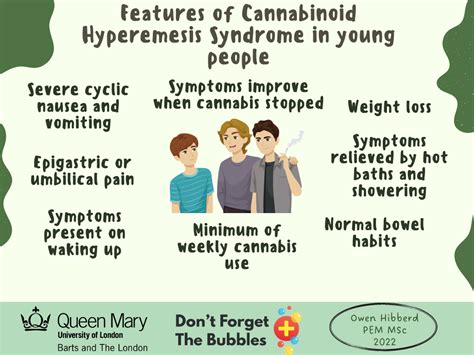
Role of THC in CHS
THC is the primary psychoactive ingredient in cannabis, and it is believed to play a central role in the development of CHS. THC can affect the brain's reward system, leading to dependence and addiction. In the digestive system, THC can slow down gut motility, leading to a buildup of food and fluids in the stomach, which can cause nausea and vomiting.Cannabinoid Hyperemesis Syndrome Diagnosis
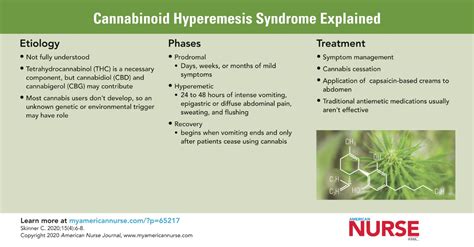
- A history of long-term cannabis use
- Recurring episodes of severe vomiting
- Abdominal pain and weight loss
- Normal or near-normal laboratory test results
- No other underlying medical condition that could explain the symptoms
Diagnostic Tests
Several diagnostic tests can be used to rule out other underlying medical conditions and confirm the diagnosis of CHS. These tests may include:- Complete blood count (CBC)
- Electrolyte panel
- Liver function tests
- Abdominal imaging studies, such as computed tomography (CT) scans or magnetic resonance imaging (MRI)
- Endoscopy or colonoscopy to rule out other gastrointestinal disorders
Cannabinoid Hyperemesis Syndrome Treatment
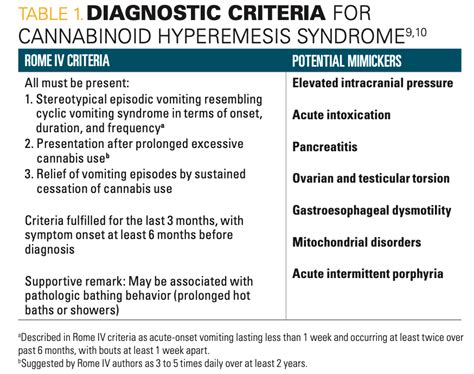
- Medications, such as anti-nausea medications, pain relievers, and antidepressants
- Fluid and electrolyte replacement to prevent dehydration
- Dietary changes, such as a bland diet or a low-fat diet
- Avoiding cannabis use
- Stress management techniques, such as meditation or yoga
Medications for CHS
Several medications can be used to manage the symptoms of CHS. These medications may include:- Ondansetron (Zofran) for nausea and vomiting
- Metoclopramide (Reglan) for nausea and vomiting
- Lorazepam (Ativan) for anxiety and insomnia
- Amitriptyline (Elavil) for abdominal pain and depression
Cannabinoid Hyperemesis Syndrome Complications
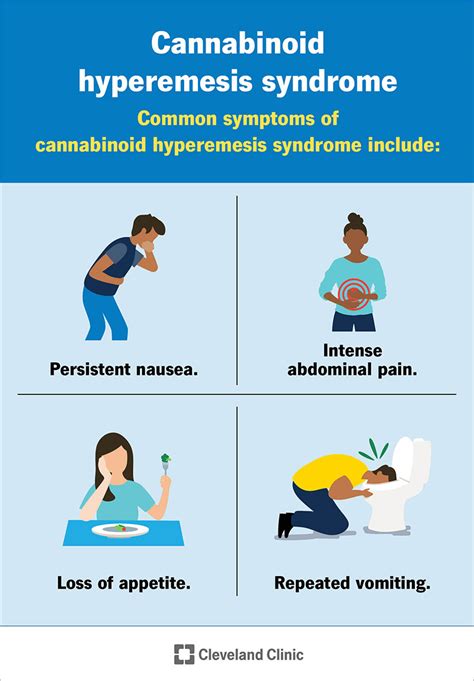
- Dehydration and electrolyte imbalances
- Malnutrition and weight loss
- Abdominal pain and inflammation
- Mental health disorders, such as depression and anxiety
- Social and economic problems, such as loss of employment and relationships
Preventing Complications
Preventing complications is essential for managing CHS. The following are some tips for preventing complications:- Stay hydrated by drinking plenty of fluids
- Eat a balanced diet to prevent malnutrition
- Avoid cannabis use
- Manage stress and anxiety through relaxation techniques
- Seek medical attention early if symptoms persist or worsen
Cannabinoid Hyperemesis Syndrome Prognosis
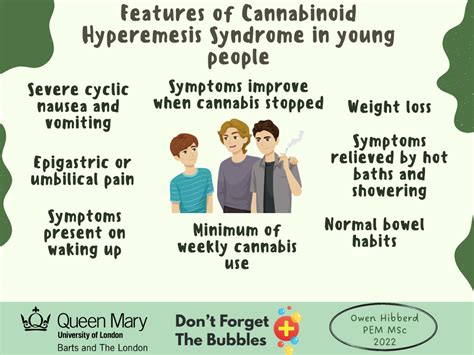
Factors Affecting Prognosis
Several factors can affect the prognosis of CHS, including:- The severity of symptoms
- The frequency of episodes
- The individual's response to treatment
- The presence of underlying medical conditions
- The individual's ability to manage stress and anxiety
What is Cannabinoid Hyperemesis Syndrome?
+Cannabinoid Hyperemesis Syndrome (CHS) is a condition that affects the digestive system and is characterized by recurring episodes of severe vomiting, often accompanied by abdominal pain and weight loss.
What are the symptoms of CHS?
+The symptoms of CHS include recurring episodes of severe vomiting, abdominal pain, weight loss, and dehydration.
How is CHS diagnosed?
+CHS is diagnosed through a combination of medical history, physical examination, and laboratory tests, including complete blood count, electrolyte panel, and abdominal imaging studies.
What is the treatment for CHS?
+The treatment for CHS typically involves a combination of medication and lifestyle changes, including anti-nausea medications, pain relievers, and dietary changes.
Can CHS be prevented?
+CHS can be prevented by avoiding cannabis use, managing stress and anxiety, and seeking medical attention early if symptoms persist or worsen.
In conclusion, CHS is a complex condition that requires a comprehensive approach to diagnosis and treatment. By understanding the symptoms, causes, and treatment options for CHS, individuals can manage their symptoms and prevent further episodes of vomiting. If you or someone you know is experiencing symptoms of CHS, it is essential to seek medical attention early to prevent complications and improve quality of life. We invite you to share your thoughts and experiences with CHS in the comments below and to share this article with others who may be affected by this condition.
